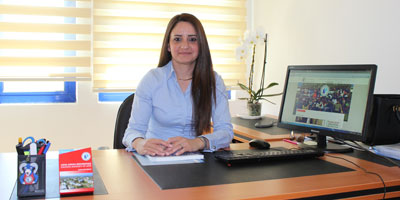EUL Academician discussed the importance of physical activity

“Lack of Physical Activity Increases the Risk of Chronic Disease”
European University of Lefke (EUL) Faculty of Health Sciences Physiotherapy and Rehabilitation Department Lecturer Asst. Prof. Dr. Beliz Belgen Kaygisiz shared important information on the subject of “Physical Inactivity”.
“Every movement that uses skeletal muscles in daily life, increases heart and respiratory rate and requires energy expenditure, is defined as “Physical Activity”. These activities can be walking, running, cycling, squatting, or free movements such as dancing or playing in the park. ”Kaygısız, stated that physical activities performed regularly at regular intervals are defined as “exercises”. She stated that exercise, which is one of the indispensable components of a healthy life, increases muscle strength, endurance and flexibility and protects against the risk of many diseases.
Kaygısız: “Inactivity” is one of the 5 important risk factors in terms of chronic disease risks.
“Physical Activity” is a concept that is the opposite of “inactivity”, which is seen as a major health risk in the world.
Today, societies have started to become a part of an inactive / still life in parallel with the developments in technology and industry. Kaygısız stated that “Inactivity” is shown as one of the 5 leading risk factors in terms of chronic disease risks and noteds that. It is estimated that about 30% of ischemic heart diseases, 27% of diabetes, about 21-25% of breast and colon cancers are caused by physical inactivity. According to the data of the World Health Organization, 3.2 million people are lost every year due to inactivity and that physical inactivity and malnutrition are thought to increase health costs.
Kaygısız: Performing daily physical activities during this period of “lockdown” is very important for health benefits.
“Due to the Covid-19 pandemic that has affected the whole world for the last 1 year, quarantine practices have started in many countries and many people have started to spend more time in their homes. Many scientific studies show that due to this “lockdown”, there is a lack of physical activity in populations of all ages and this has the risk of increasing the rate of chronic diseases that may occur in the upcoming years.” Kaygısız stated that, considering all these factors, she said that doing daily physical activities during this period of “lockdown” is very important in terms of health benefits. Kaygısız, noted that it is important to regulate the exercise to be done according to the age, endurance and existing disease state, “Although there are restrictions on activities that can be done outside the home, everyone at home should determine a type of physical activity / exercise according to their own situation and do it regularly in the future years as it is very important in terms of protection from diseases that may arise. In addition, in this period when our immune system should be good, regular exercises at mild and moderate intensity will play a supportive role. 25-45 minutes of daily exercise or 45-60 minutes of exercise or physical activity 3 days a week are recommended in many studies. Also, in many studies, it has been shown that regular moderate exercise of at least 150 minutes per week is beneficial in terms of preventing many diseases by supporting the immune system.
Lastly, Kaygısız stated that “The importance of regular physical activity is increasing day by day within the scope of improving and protecting health. Accordingly, in order to achieve the desired health benefits, it is important that the individual determines a suitable program for himself by taking an opinion from a physiotherapist, choosing an exercise he likes and continuing these exercises by planning the frequency, intensity and time according to his purpose.
